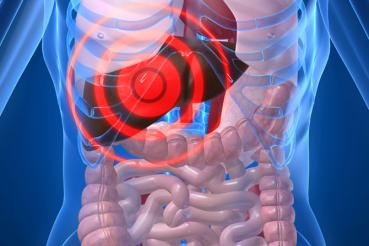Cirrhosis, or late-stage scarring of the liver, is a chronic, life-threatening condition. Many types of liver disease can cause progressive scarring that ultimately results in cirrhosis, including alcoholic or non-alcoholic fatty liver disease, hepatitis B or hepatitis C, or genetic conditions like Wilson's disease.
Not only does this scarring affect how your liver works, it can also increase your risk of liver cancer.
Signs You Should Get Treatment for Cirrhosis
Some people with cirrhosis won't experience any symptoms.
If you have the following symptoms, you should see a doctor to be evaluated for possible liver disease:
- Feeling tired or weak
- Loss of appetite
- Unexplained weight loss or weight gain
- Mild pain in the upper right part of your abdomen
- Severe itching
- Jaundice (yellowing of skin)
- Bruising easily
- Water build-up in your belly
- Throwing up blood
Cirrhosis Treatment at Rush
Hepatologists, gastroenterologists and other cirrhosis specialists at RUSH are here to help you address the cause of your cirrhosis. We can work with you on a cirrhosis treatment program to reduce your risks of developing liver failure.
We can also help you prevent and manage the complications of cirrhosis, such as ascites (fluid in the abdomen), esophageal varices (enlarged veins in the esophagus), hepatic encephalopathy (loss of brain function) and liver cancer.
Your cirrhosis treatment at RUSH may include the following strategies:
- Lifestyle modifications, such as eating a nutritious diet, limiting salt and maintaining a healthy weight
- Medications to address the cause of your cirrhosis and manage your symptoms
- Liver transplant if your liver is too damaged to function
- Help with addiction, including alcohol abuse and use of illegal drugs, when needed

RUSH Excellence in Cirrhosis Treatment
- Quick access to answers so you can start treatment sooner: We understand that you don't want to wait weeks to see a liver specialist. Our doctors can often see you within a week of your request. You can meet with us in-person for cirrhosis care at locations across Chicago and the suburbs and virtually through telemedicine.
- Minimally invasive options to diagnose and treat cirrhosis: If your doctor suspects cirrhosis, RUSH offers several tests that can assess your liver without the need for a biopsy. This includes transient elastography — such as FibroScan and acoustic radiation force impulse (ARFI) imaging — as well as magnetic resonance elastography. If you need a biopsy, you may benefit from an endoscopic ultrasound (EUS) from our interventional endoscopy program. With an EUS, an interventional endoscopist takes a biopsy (tissue sample) from your liver without surgery, so you have less pain and downtime. If you have advanced liver disease, our radiologists can perform nonsurgical treatment such as the transjugular intrahepatic portosystemic shunt (TIPS) procedure to improve blood flow in your liver, ease swelling in your abdomen and improve your survival.
- Liver transplantation outcomes: If you have severe cirrhosis, our liver specialists will help you understand your options, which may include a liver transplant. That's an area of excellence at RUSH University Medical Center. Our liver transplant program has some of the best survival rates of any hospital in Chicago and in Illinois. Our one-year patient survival rate for liver transplants is 94%, according to the January 2020 report from the Scientific Registry of Transplant Recipients (SRTR).
- Your resource for a second opinion: Our liver specialists can make sure you understand all possible treatment options for your cirrhosis so you can make the most informed decisions about your care — and get started on the right treatment plan as soon as possible.




